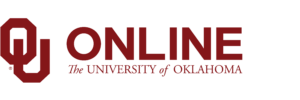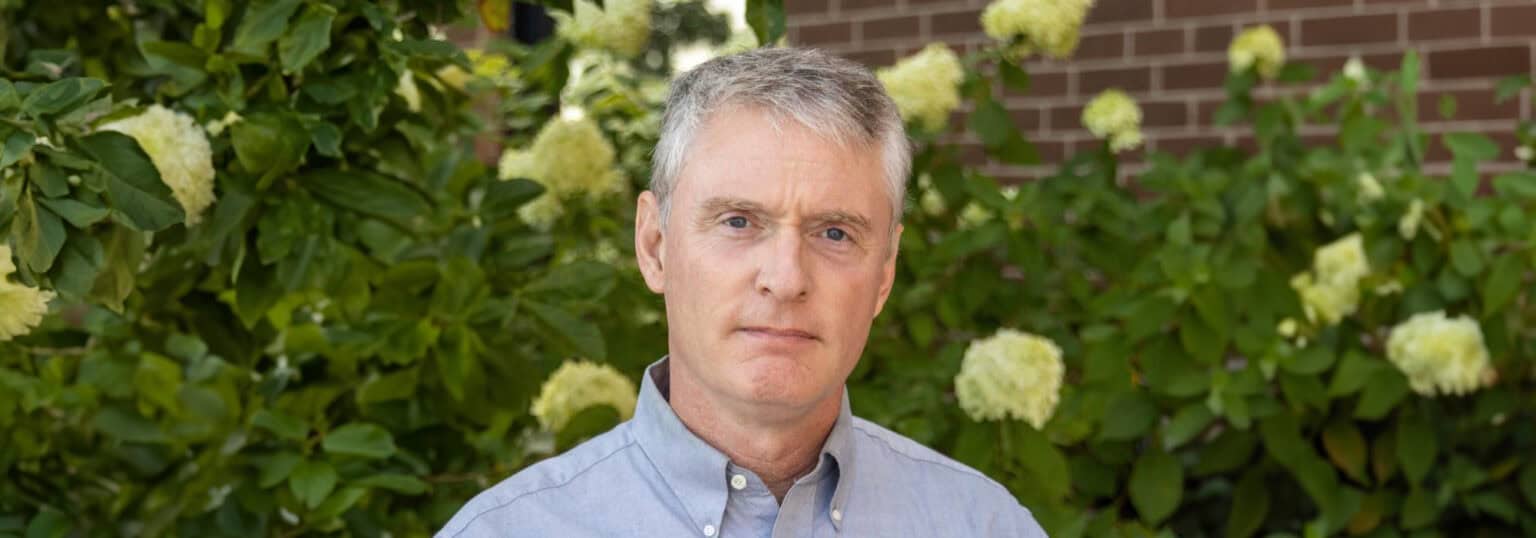
Faculty Spotlight - Coleman Patterson
by Michael Mahaffey
Coleman Patterson is a faculty member for the OU College of Professional and Continuing Studies, leading the college’s business administration degree completion program. He joined OU in the summer of 2023.
How long have you worked for PACS/been teaching?
I started working for OU in the summer of 2023. I’ve been full-time faculty at universities since the fall of 1996.
Tell us a little more about your education, professional background and experience, including what you do outside of teaching for PACS.
I was a finance major as an undergrad at the University of Florida. At that time, I thought that maybe a career in investment, real estate or banking was in my future. My dad had a career in journalism. In his late 40s, he decided he wanted to do something else, so he became a college professor like his two brothers. The summer after I finished school, my dad dropped a copy of the Chronicle of Higher Education in my lap and said, “Hey, kid, have you ever considered a career in higher education?”
That summer, I started working in higher education in student services at a big community college in Florida. I worked in financial aid, advising and testing assessment, and I was able to get my master’s in education, my M.Ed., at night at the University of Florida. I then got my Ph.D. in management from the University of Alabama, so I started in business, got some education experience, then went back into business to get the hands-on classroom teaching experience and jumped right in and started teaching.
Outside of teaching, I’m a long-time racquetball player and instructor. I also teach a family-oriented karate class on Saturday mornings at the Family Life Center at First Baptist Church here in Norman. I had a karate and fencing school in Texas for 11 years, and programs are still going on there. It started at my previous university as a Tae Kwon Do club, then became a P.E. class, later became a program at our church in Abilene, and eventually turned into a school.
I’m a cyclist, and I’ve done nine long-distance bicycle rides as philanthropic projects with some of my management students. In those previous rides, we rode across eight different states, 8,100 miles, and it took about 13 weeks across all the rides. I am in the docent training program through the Oklahoma Arts Council and will be a tour guide at the Oklahoma State Capitol starting in January or February 2024. I also play in several community bands. I play bass clarinet in our church orchestra, contra-alto clarinet in the Norman Clarinet Choir and the Oklahoma City Symphonic Band, and alto saxophone in the New Horizons Jazz Band. Another fun thing I picked up in the last 14 months is the bagpipes!
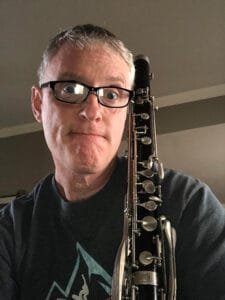
What is your favorite thing about being an instructor at OU?
It’s the ability to connect with students and interact with other people. I’m not here to brainwash or indoctrinate. Hopefully, what I’m here to do is to open their minds to see possibilities and be open to new things. Higher education is powerful, and it can set them off in a direction in life that won’t just influence them but generations after them. That’s what’s important about what we do. It’s changing the trajectory of families. We’ve got one life to live. We’re only on earth for a short time, so let’s do some cool stuff, and cool stuff is more fun when you have people and friends around you.
What is your best teaching tip for other instructors?
I’m a big believer that in teaching management, in teaching leadership, that you have to practice. It’s not just an intellectual pursuit. Just like being a musician or an athlete, you have to understand the rules, principles and philosophies, but then you have to go practice.
It’s also important for instructors to really see the importance of what we do. It’s so critically important and worthwhile. You can inspire people to change whole communities. They can’t just use the mental models that they’ve grown up with of what teachers are. You should push the boundaries of what it means to be a professor. Don’t be so locked into models of “this is how it’s always been done.” The different fields all intersect with life, and in those moments, capture that and use that as a teaching lesson.
Too many people only do it the way it’s always been done. You have to get outside the classroom, outside the norm, and see there are better, more interesting, more powerful ways to connect with students and give them the opportunities to open their minds and learn. Once you’ve started doing that, it’s really hard to go back, so my challenge now is to bring that into an online environment, but it’s one I’m up for.
What advice would you give other instructors for balancing teaching and other responsibilities?
The neat thing about what we do as teachers is I’m not done with my teaching when I shut my office door and leave. I wake up in the night and think, “Oh, this would be cool.” Our brain is always on, and as long as we’re always looking for new opportunities for experiences, we can turn them into teachable moments. Look for times when you can relate those moments back to your teaching, whether it’s a social media post or teachable example, and use those times to connect. We have these great media studios right here in our pockets, and we can record things and load them to YouTube or Canvas and use those times to connect. I have all kinds of weird little videos on my YouTube that relate to something in class that I can share with my students.
What is your favorite course to teach?
Leadership and organizational behavior are my two favorite classes. I’m a big fan of entrepreneurship, as well, because it’s about taking an idea to reality through and with other people. Leadership is also about taking an idea to reality through and with other people. In my world, there is a lot of overlap. I also love statistics because it is very rational. There’s a procedure, a technique and a right answer. I like the rational and the answer in the stats world, and I love the ideas and the concepts in the theory world. If I had to teach on just one side or the other, it would drive me nuts!
Is there a student or class that has influenced or impacted your life in any way?
From when I was a student, the one class that was the most influential to me was my first master’s class. It was one of the most brain-opening experiences working with these working professionals who were coming in from around Florida. I was the youngest one in the class. We were all like-minded in our classes, and to work with like-minded people who were passionate professionals, that’s when my brain turned on. When I got into my Ph.D. program, it just accelerated.
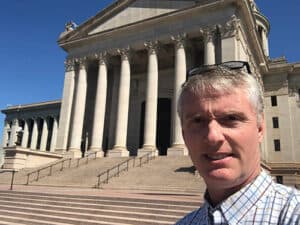
What advice do you have for adult students returning to school?
It’s important to be open to other points of view. Their classmates are a cohort of like-minded people who have decided to come back and finish something they’ve started before, and they’re coming from all different backgrounds and experiences. Our students are so supportive of each other, and maybe it has to do with that.
What is your favorite thing about teaching adults?
I got involved with teaching online three years ago at a public university in Texas, and those interactions with older students who can recognize and appreciate management, leadership, teamwork, organization and business because it’s real to them. I appreciate their connection to and understanding of the material. We go over a concept in our book, and they say, “Hey, that just happened at work. That really explains this thing that I’m living through right now.” I appreciate them deciding that higher education is valuable and important. They’re wedging in time among family and work responsibilities and whatever time commitments they have to earn their degree. I appreciate and respect that.
What are the challenges and opportunities that come with teaching courses online?
As far as challenges, my students connect more with me than I have a chance to connect with them. I want to make this experience as engaging as possible. With our asynchronous courses, I post announcements every day, just as I would in a classroom. I try to engage them as much as I can using videos and little supplemental things to introduce ideas or thoughts. I don’t want them to come through a class feeling like they’re just reading stuff that’s been posted who knows when in the past, grades mysteriously appear in the grade book and there’s no interaction. I had that experience as a student in some online classes in the early 2000s, and they made me realize we can do this better.
COVID-19 kind of forced us into this new world of realizing we can communicate and interact across great distances. I’m able to connect with them through the projects that they’ve chosen, that they have a passion for. That’s part of my challenge – not just doing online education, but doing it well and continuing to learn, knowing that I can improve.
There are many opportunities, like the ability for students to fit an education in around their busy lives. When I was working on my master’s degree, I was working at a community college, and for two years, I would get off work and drive across town to UF to go to school. The people in my classes with me were from all over the state. When class was over at 9 o’clock, they were getting back in the car and driving home, and some wouldn’t get home until around midnight. That was a serious commitment. Online education removes a lot of those barriers. We can have people now receive a quality degree from a wonderful university. They can spread around the world, doing it as an asynchronous program, and they can do it around their busy schedules. That’s what I like about this.
Because we can record everything, students can go back at any time and rewatch the videos. In a traditional classroom, I work the problem on the board once, we all look at it, then I erase it, and if you’re not there, you missed it. If you didn’t take great notes, you missed it. Now, we can have a whole library of the instructor working through problems and concepts. I’m up for discovering and creating new opportunities.
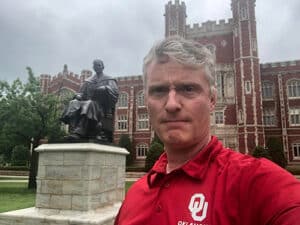
What kind of experience do you want students to have in your courses?
I tell my students that we tend to operate within blinders, like a horse would wear, and those blinders come from our past experiences. That’s how we understand the world. But our job as educators is to push those blinders farther and farther away, to give them more experiences so they have a bigger perspective of the world. That’s my goal with all my classes – to increase their understanding of the world and the people we share this planet with and interact with every day.
What do you do in your courses to encourage students to engage with you and each other? How important is it that they develop a sense of camaraderie?
I post an announcement every day, and in those announcements, I’m talking to them and encouraging them. I can thank them and maybe steer them in a different direction. I want them to feel a sense of connectedness and that it’s not just a pre-recorded “Welcome to class today. How may I help you?” and it’s more, “I just got done reading your stuff, and here’s what I see.” So, it’s a real sense of connection. And because of the way I recorded it, I can’t use it next term. Next semester has to be new for them.
Normally, in a regular semester, if I’m teaching four classes, I’m in class 12 hours a week, plus the prep, plus the grading, plus the student questions and emails. The way I see it, I owe these students a lot of time and attention, and I try to invest that in them. I had a friend who took an online class, and they said they felt they hardly knew their professor. They had no connection to a human. I want my students to feel the opposite of that.
OU Online loves to showcase the talented instructors who teach our online master’s and bachelor’s degree courses. If you know an instructor who would make an interesting feature, please email us at online@ou.edu.
Search
Categories
Popular Tags


